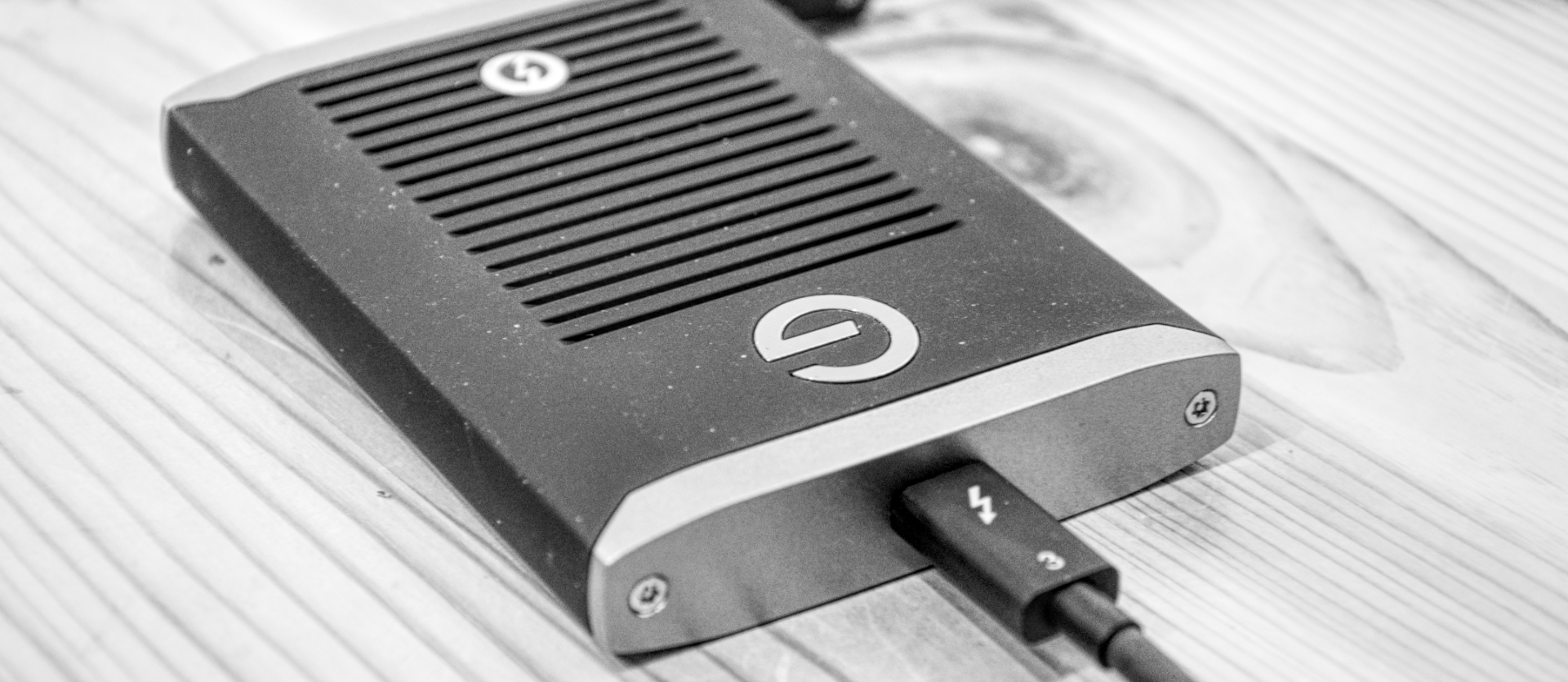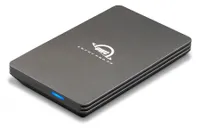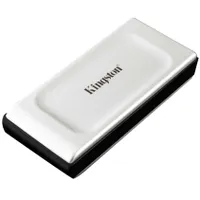TechRadar Verdict
Over Thunderbolt, it offers impressive speeds, but it won’t work with USB. And the asking price for the 2TB model is beyond crazy. Get the G40-PRO instead, as it works with both USB and Thunderbolt, and it is half the cost of the 2TB model.
Pros
- +
Thunderbolt connectable
- +
Exceptional transfer speeds
- +
Tough enclosure
Cons
- -
No USB support
- -
Expensive
- -
Maxes out at 2TB
- -
Larger than it needs to be
Why you can trust TechRadar
SanDisk Professional G-DRIVE PRO SSD: Two minute review
Here is the spec of the SanDisk Professional G-Drive PRO SSD sent to TechRadar for review:
Interface: Thunderbolt 3 (40Gbps)
Capacities: 500GB, 1TB and 2TB
Casing material: Metal and TPU
Quoted Speeds: 2800MB/s read and 2400MB/s write
Operating temperature: 5-35C
Warranty/support: limited 5-year warranty with free technical support
Compatible with: macOS 10.13+ (Time Machine compatible), Windows 10+ (via reformat)
Dimensions: 112 x 80 x 17 mm
Default format: APFS
Weight: 200 g
What a difference adding ‘PRO’ makes.
At first glance, it would be easy to confuse this SSD drive with the SanDisk Professional G-Drive SSD, as the title is just three letters different.
Whereas the non-PRO version of this drive is exclusively USB, the PRO model is, for no obvious good reason, physically larger, lacks the 4TB option, and costs more per GB.
What you get in return for the extra money is Thunderbolt connectivity and the much higher levels of performance that the bandwidth of that technology allows.
Where USB 3.2 Gen 2 drives hit the performance buffers at around 1,000MB/s, the Thunderbolt-connected SanDisk Professional G-Drive PRO SSD can read at over 2,800MB/s and write at 2,400MB/s. That’s the same speed as the SanDisk PRO-G40, our current top performer for Thunderbolt-connected storage.
Being able to read or write at these high levels is helpful for those that need to get on a plane or train or have other time pressures on them.
The available capacities are 500GB, 1TB and 2TB, and all these are roughly the same size and weight irrespective of capacity.
Sign up to the TechRadar Pro newsletter to get all the top news, opinion, features and guidance your business needs to succeed!
What’s mildly confusing about this drive is that it is ample for an NVMe-based external SSD, being 112 x 80 x 17mm. That’s about the same length as the PRO-G40 but almost a third wider. It’s also much thicker. When you consider they do similar jobs and the smaller drive has greater damage resistance, this size difference makes little sense.
The interface on the PRO-G40 is more sophisticated, as it can handle Thunderbolt and USB, not just Thunderbolt. And the PRO-G40 has the same 2TB maximum capacity and much greater crush resistance, offers waterproofing and is smaller.
When put side by side in this way, the SanDisk Professional G-Drive PRO SSD is eclipsed by the PRO-G40, which matches the PRO on speed and is superior in almost every other respect.
It’s tempting to conclude that any advantage the PRO has must be the cost. In the UK, the 2TB PRO-G40 costs £ 495.99, and $449.99 in the USA. The comparable prices for the SanDisk Professional G-Drive PRO SSD 2TB are £1,050.99 in the UK. In the USA, the 2TB model is currently unlisted, and the only capacity that is available is 500GB.
Unless you find an exceptional deal from a retailer wishing to flush these out of the channel, we’d recommend an alternative design, possibly from SanDisk.
SanDisk Professional G-DRIVE PRO SSD: Price and availability
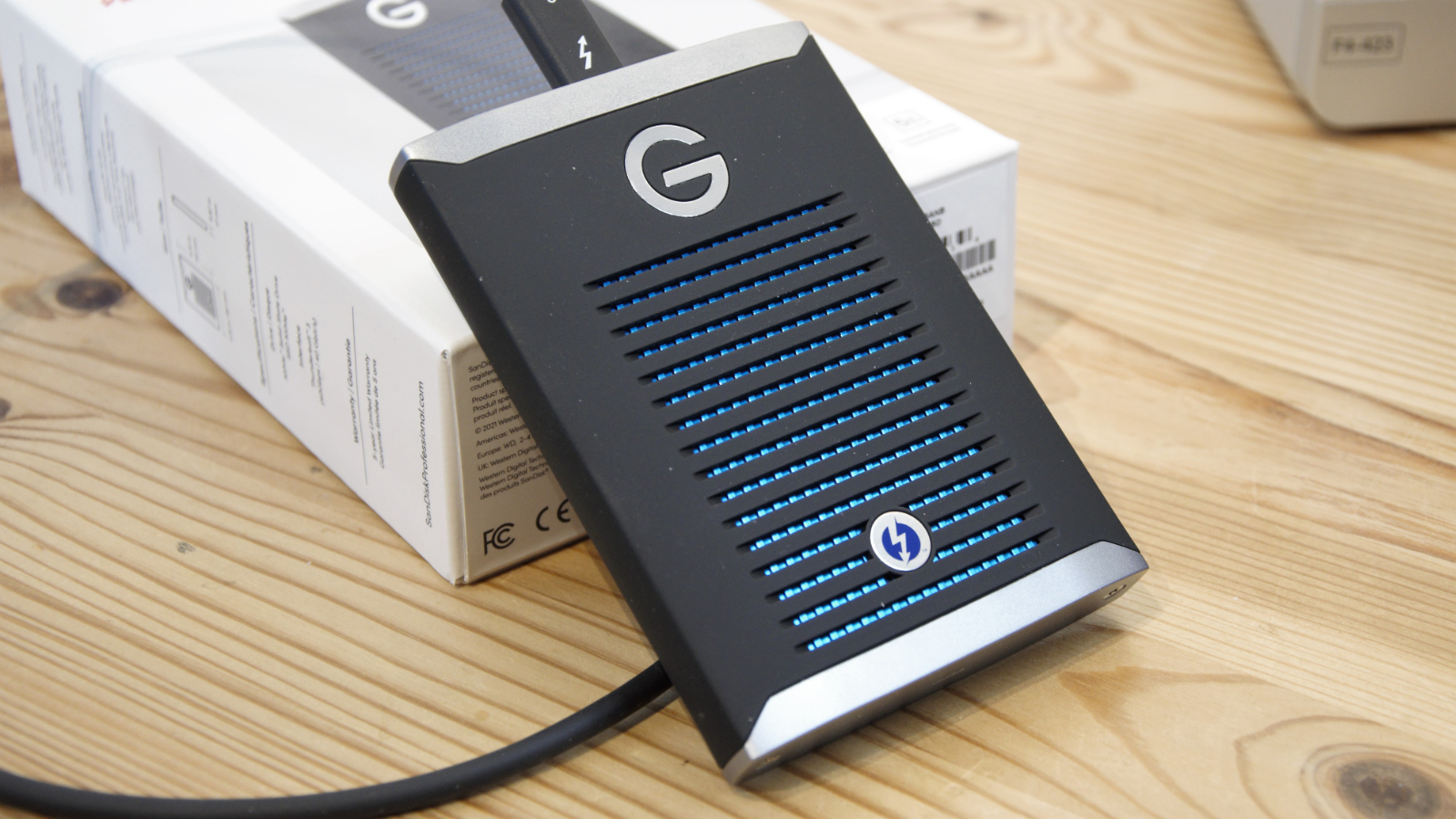
- How much does it cost? From $189.99 / £267.99
- When is it out? It is available now
- Where can you get it? Available from the larger online retailers in most regions, but not in all capacities.
In Europe, it is possible to find all the available capacities (500GB, 1TB and 2TB) through online retailers. For those in the USA, most retailers only carry the 500GB model.
For those in America that think $199.99 is way too much to pay for a 500GB external SSD, they need to take a moment to consider that the 2TB option is a breath-taking £1,050.99 in the UK.
These prices are shocking for a drive that doesn’t connect to USB, only Thunderbolt. And, it is dramatically undercut by SanDisk with the dual interface PRO-G40.
As exclusively Thunderbolt connecting storage goes, the PRO is competing with a select group of drives, mostly by OWC and Plugable, and the majority of those are cheaper than the PRO.
- Value: 1 / 5
SanDisk Professional G-DRIVE PRO: Design
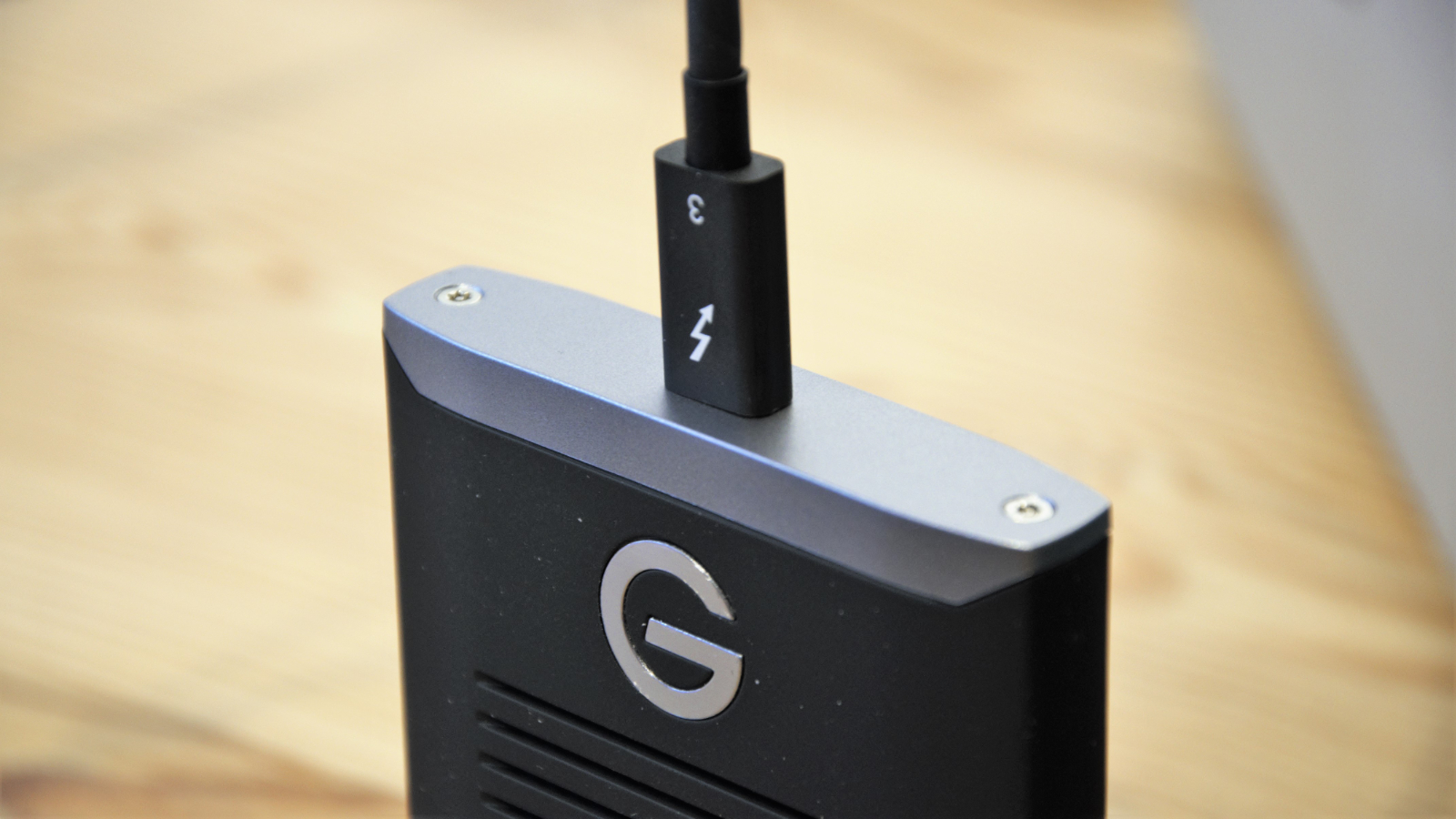
- Tough-ish enclosure
- No carry case
- Only Thunderbolt interface
The aesthetics of this drive are in line with the non-PRO version of this drive and other portable SSD storage with the G-Drive branding.
This is bigger than the other external SSDs, and it seems odd that it is this size, given how small the NVMe technology inside is.
The larger-than-anticipated enclosure does protect the contents from a 3M drop onto
a carpeted concrete floor, so make sure to carpet any concrete you are likely to do this on.
It can also withstand 1,000 lbs of crush force, a quarter of the destructive resistance of the PRO-G40 that matches the drop height. However, the PRO-G40 is waterproof, and this drive is not.
While it is larger than most external NVMe enclosures, it can still fit in a pocket, although you might want to detach the Thunderbolt cable first.
Disappointingly at the steep asking price, SanDisk doesn’t provide a carry case or pouch for the drive and cable.
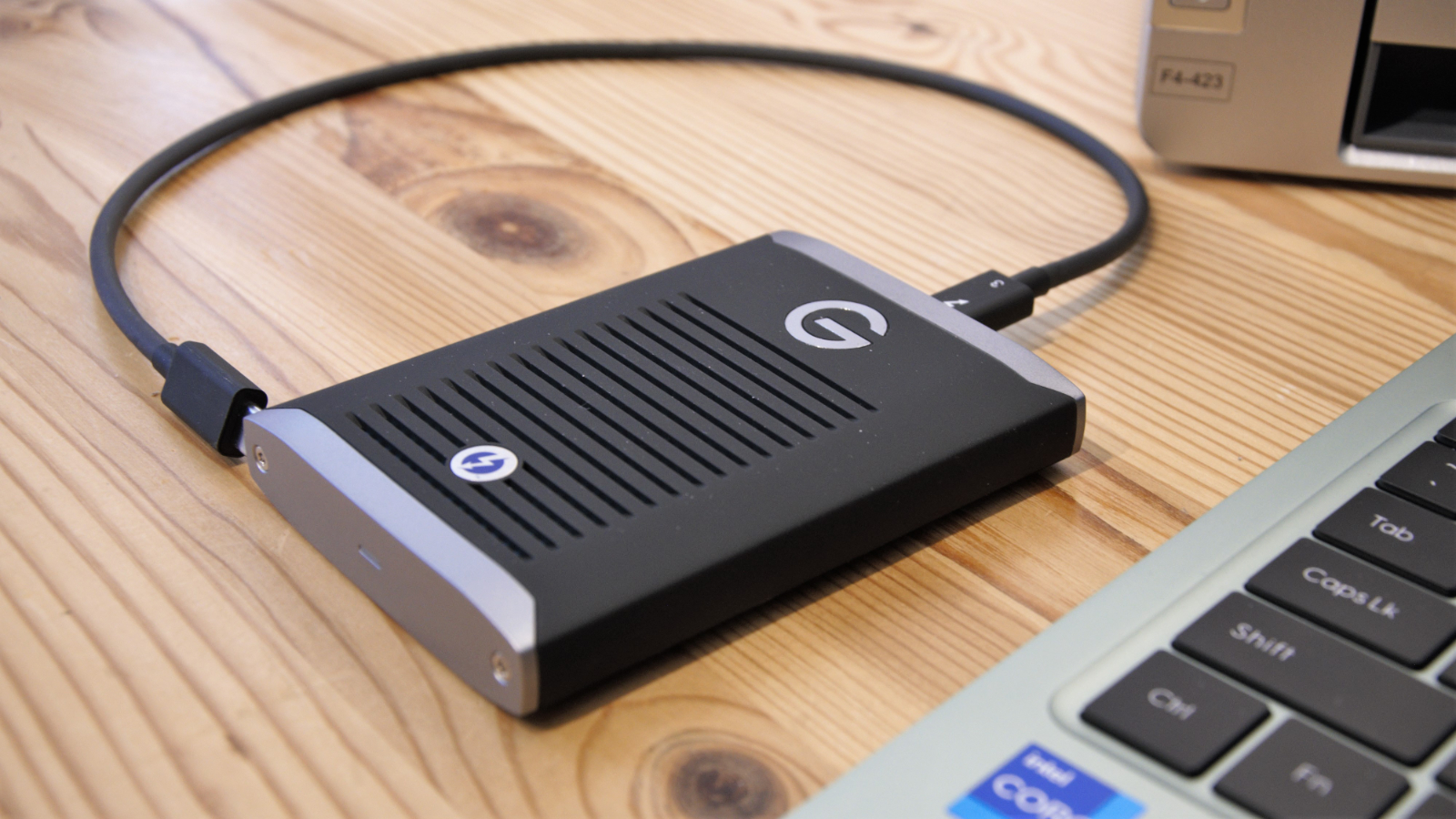
The included cable is only 20cm long and made explicitly for Thunderbolt 3.0 and its repurposed USB-C interface.
The cable is too short for use with a desktop system but fine for a laptop, assuming that it has Thunderbolt ports and not USB-C. The potential confusion that could easily arise when the drive and its cable plug easily into a computer, phone or tablet with USB-C but then fails to work.
Hopefully, in the future, with USB-C 4.0 and its Thunderbolt backward compatibility, these issues should be eliminated, but at this time, it's up to the hardware users to know if they have USB-C 3.2 or Thunderbolt on ports that look identical on the outside.
- Design: 3 / 5
SanDisk Professional G-DRIVE PRO SSD: Features
- Apple Pre-formatted
- No hardware Encryption
- Limited capacities
The features of the SanDisk Professional G-Drive PRO will be familiar to those that have experienced any of the SanDisk Professional SSD products recently.
These are that the drive comes pre-formatted for Apple Mac, and not Windows PC, because for whatever reason, SanDisk assumes Windows users understand partitioning and reformatting drives, where it is beyond Apple customers.
We’ve seen numerous ways to avoid this issue, some sold by Western Digital, the owners of the SanDisk brand, so why they didn’t use them here is a mystery.
Perhaps that would have required some software for both platforms on a dual access partition, and SanDisk has made no attempt at any software for this drive at all.
As a result, Microsoft Windows users will discover that the drive doesn’t appear if they connect it, even if they have Thunderbolt ports.
If they reformat it using the Management Console, the drive will appear, should they have those technical skills.
Once the drive is working, it is possible to encrypt the drive contents to avoid the data on it being accessed by a thief. Although, you can only use software encryption, Like Microsoft BitLocker, as the NVMe drive inside doesn’t support hardware encryption.
But possibly the biggest issue with this design is the maximum capacity of 2TB, an amount that might have seemed huge a few short years ago but looks underwhelming now.
SanDisk already has USB SSDs with 4TB, and with larger NAND modules coming this year, drives with 8TB and 16TB are likely to be common soon, and even larger capacities are coming.
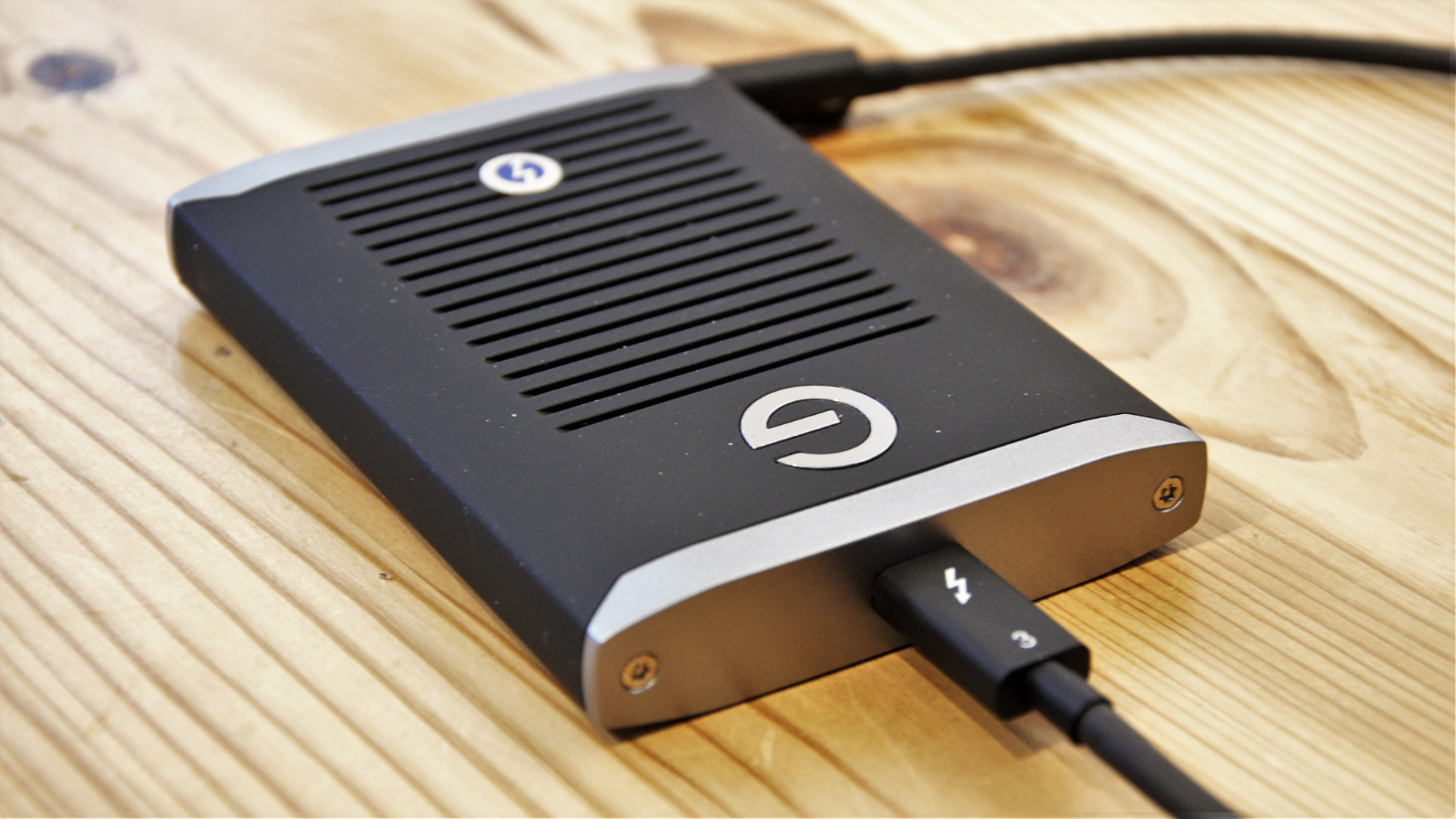
- Features: 3 / 5
SanDisk Professional G-DRIVE PRO SSD: Performance
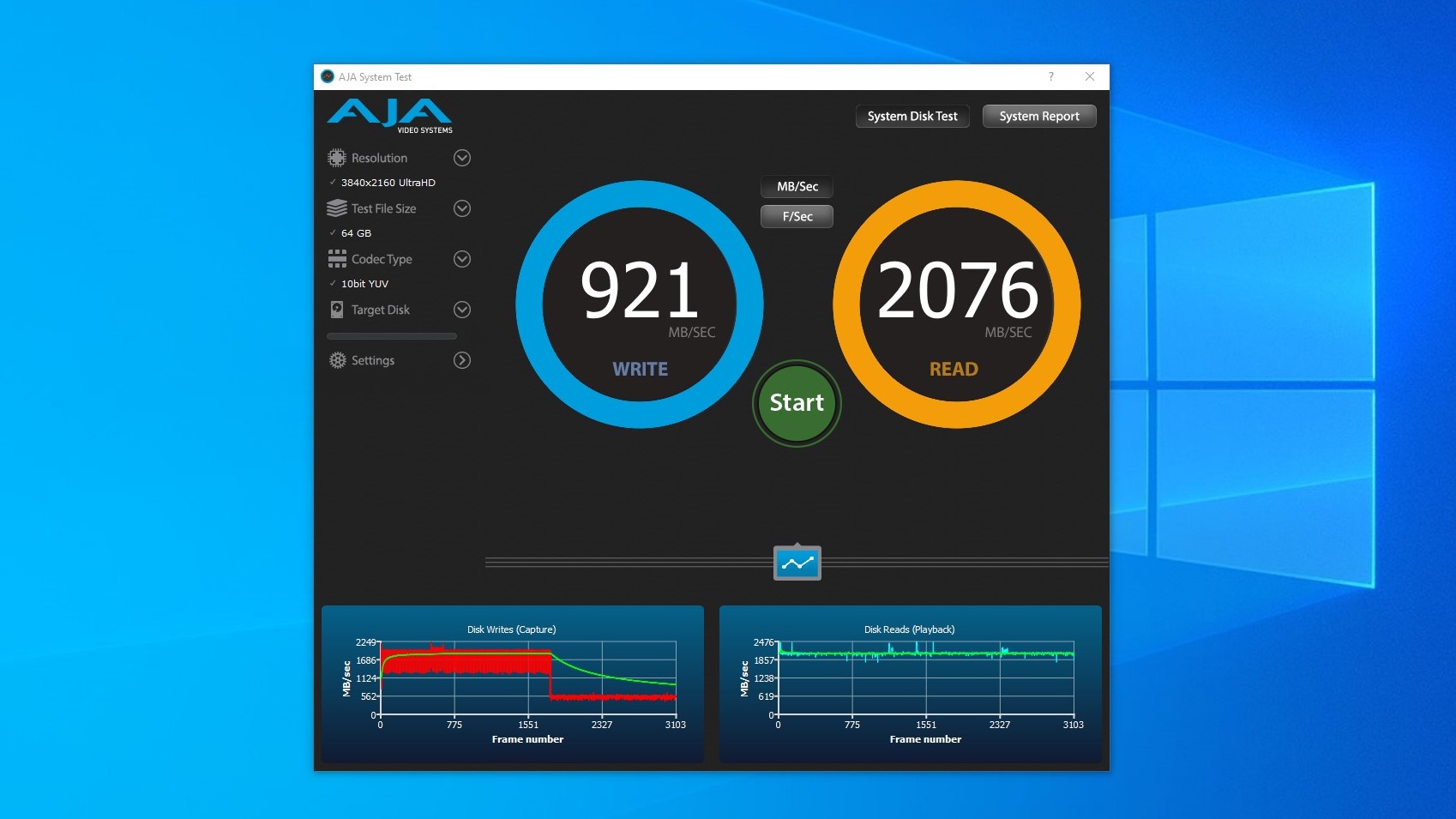
- High speeds on Thunderbolt
- SLC Cache brick wall
There is a good selection of Thunderbolt-exclusive drives around that can deliver better than USB 3.2 levels of performance, so how does the PRO compare?
In short, it is on par with the excellent PRO-G40, delivering blistering 2750MB/s reads and 2500MB/s writes using CrystalDiskMark 8.0.4. as a simple benchmark test.
However, the problem with quoting those numbers is that the PRO will only sustain those, or specifically the write performance over a short sprint.
Using the AJA Video Systems test, and a single 64GB file, the test started well enough with a write performance of greater than 2,000MB/s until it wrote around 34GB.
We know that this drive has an SLC cache of 14GB, and so we assume that system caching represented the other 20GB until the PRO ran out of writing steam.
Once the write cache became saturated, the performance declined significantly to an average of 921MB/s when it hit the end of the 64GB file.
Since NAND makers moved away from using DRAM to cache to make cheaper SLC technology solutions, this isn’t an issue unique to this drive, but it is something you need to be aware of.
If you don’t throw greater than 32GB files at it, the performance of the PRO is excellent, assuming you have a 40gbit/s Thunderbolt capable port.
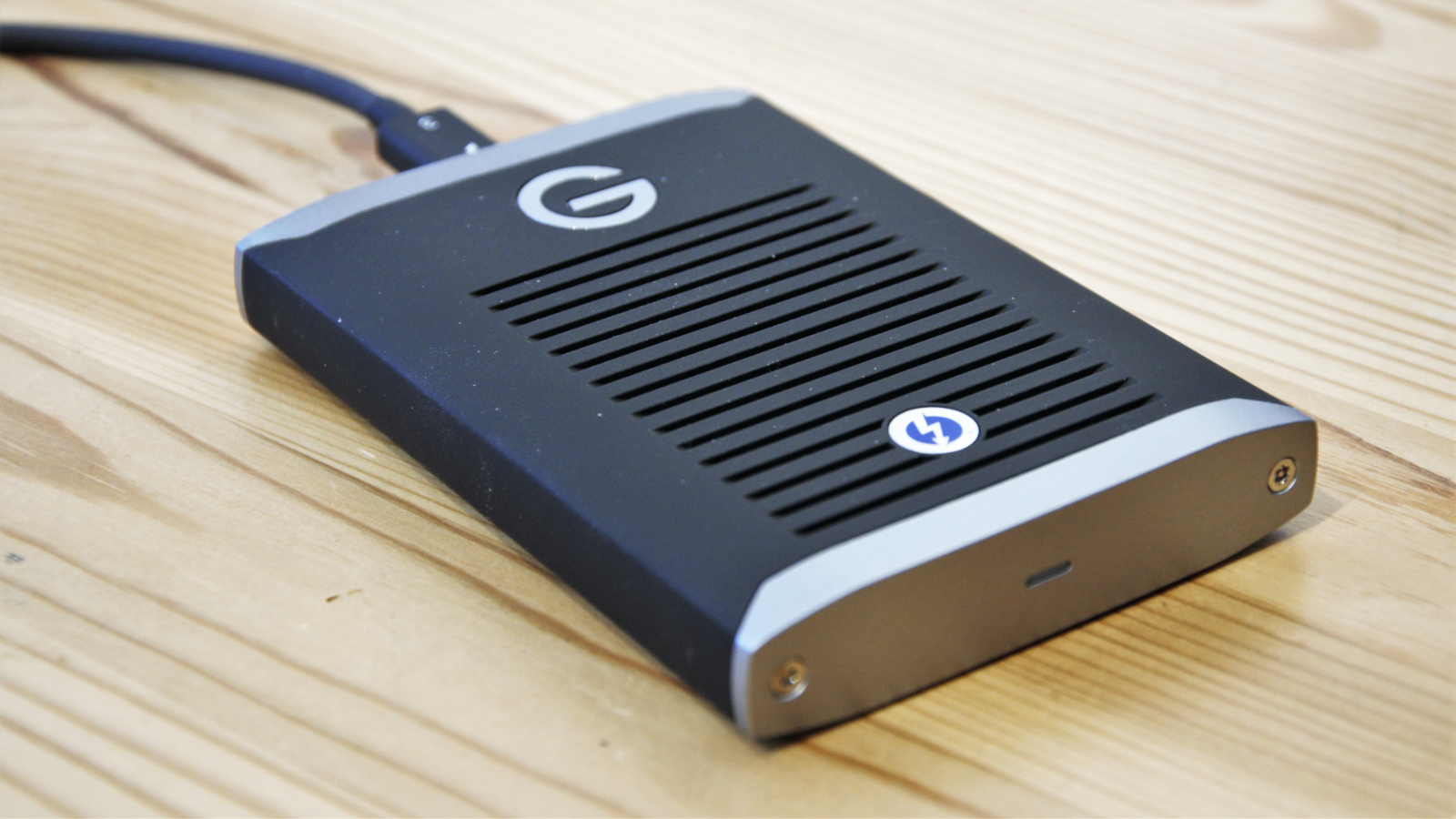
- Performance: 5 / 5
Designing a drive to be exclusively Thunderbolt seems like a bad idea and one that the newer PRO-G40 neatly circumvented.
If you exclusively use Thunderbolt and you don’t mind paying over the odds for a 2TB maximum capacity, then this might be ideal, but there are so many alternative solutions that don’t have these restrictions making it seem unnecessarily niche.
Buy the PRO-G40 instead, or wait for the Tsunami of USB 4.0 drives with massive capacities that are likely to appear later this year.
SanDisk Professional G-DRIVE PRO SSD: Report card
| Value | Exceptionally expensive and already superseded | 1 / 5 |
| Design | Elegant design but is larger than it needs to be | 3 / 5 |
| Features | Only Thunderbolt connectivity, no USB support, software or hardware encryption. | 2 / 5 |
| Performance | Very quick over Thunderbolt | 5 / 5 |
| Overall | Expensive, but there are better choices, some from SanDisk | 3 / 5 |
Should you buy a SanDisk Professional G-DRIVE PRO SSD?
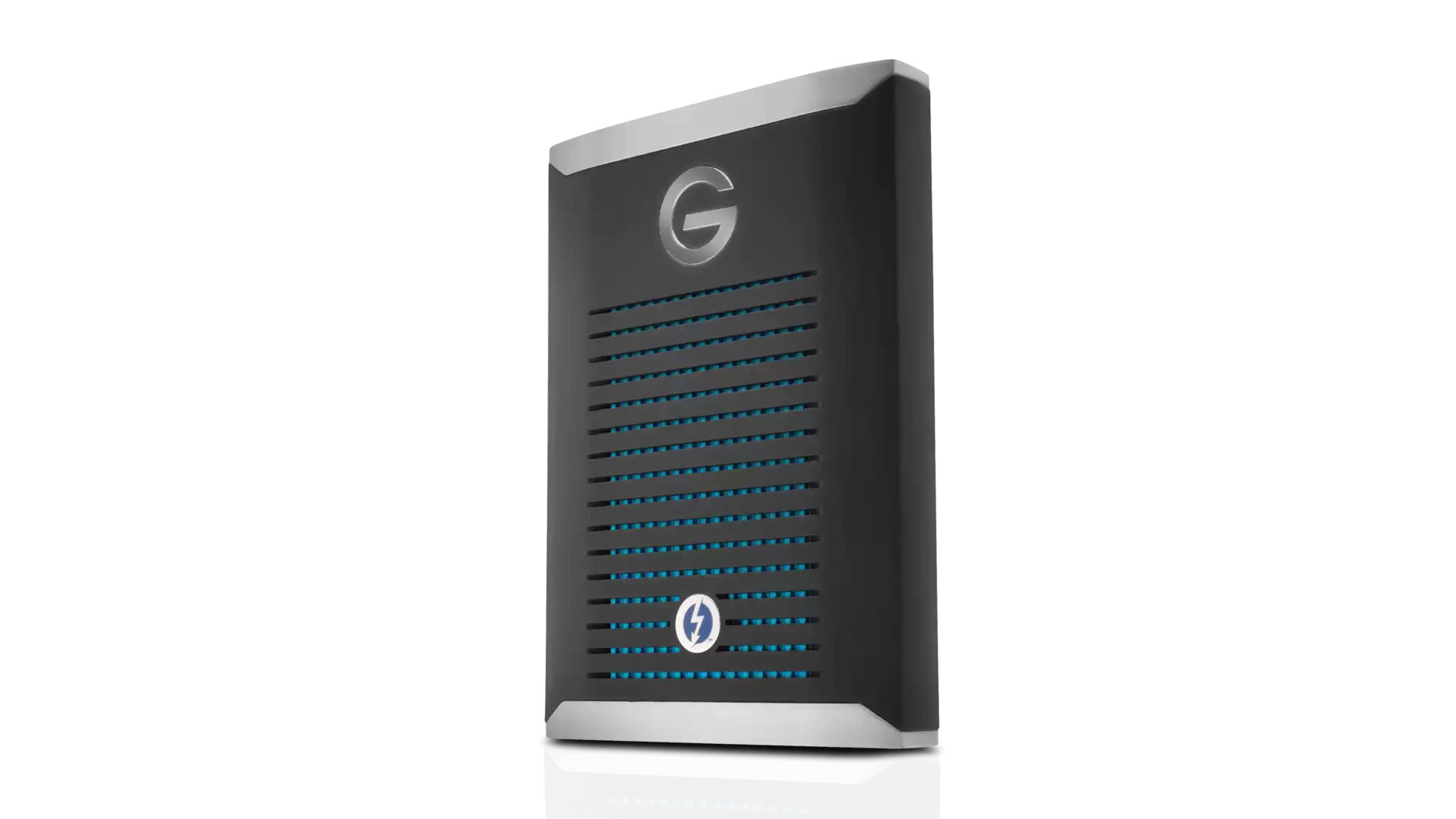
Buy it if...
You use Thunderbolt exclusively
Without Thunderbolt, SanDisk Professional G-Drive PRO SSD is relegated to being an excessively expensive external drive with limited capacity. But with Thunderbolt, it flies!
You own an Apple Mac
This drive comes pre-formatted for you, allowing for a plug-and-play experience.
Time is money
The performance of this drive allows files to move between the host system and the drive very rapidly, helping you catch that flight or be home that little bit earlier.
Don't buy it if...
Budget is an issue
If the budget is tight, then avoid this solution entirely. Possibly one of the most expensive drives per GB available.
You use USB-C or USB-A
This drive only works on Thunderbolt and possibly the new USB 4.0 ports.
2TB isn’t enough space
Depending on the internal storage of the computer you are backing up or the amount of data you need to store, 2TB might not be enough. SanDisk offers 4TB on the SanDisk Extreme Portable SSD V2, but not on this drive.
Also consider
SanDisk Professional PRO-G40 SSD
Smaller, lighter, compatible with both USB and Thunderbolt, able to withstand much greater crush force than the PRO, and cheaper. It’s not inexpensive, but it’s the better solution overall.
Check out our SanDisk Professional PRO-G40 SSD review
OWC Envoy Pro FX Portable SSD
Another expensive Thunderbolt drive, this time finely engineered by OWC. It has the same maximum 2TB capacity as the G-Drive PRO, but the NVMe drive inside supports hardware encryption.
Check out our OWC Envoy Pro FX Portable SSD review.
Kingston XS2000
A very small but offering potent performance, the Kingston XS2000 is an interesting option for those wanting something more than a by-the-numbers USB SSD.
The snag is that getting the full performance requires a USB 3.2 Gen 2x2 port, and not many computers have those as standard.
Check out our Kingston XS2000 review
We've rated the best external hard drives.
Mark is an expert on 3D printers, drones and phones. He also covers storage, including SSDs, NAS drives and portable hard drives. He started writing in 1986 and has contributed to MicroMart, PC Format, 3D World, among others.
